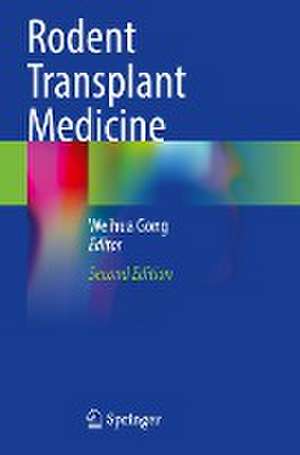Rodent Transplant Medicine
Editat de Weihua Gongen Limba Engleză Paperback – 3 ian 2024
This book presents uniform surgical procedures in mouse and rats, which produce comparable data, efficiently enhancing the translational research from bench to non-human primates and beyond. In this second edition, authors updates its recent progress. In addition, 3 chapters in mouse organ transplantation are added.
It will be of great value to transplant researchers, research fellows and clinicians in many surgical specialties.
| Toate formatele și edițiile | Preț | Express |
|---|---|---|
| Paperback (2) | 331.19 lei 38-44 zile | |
| SPRINGER NETHERLANDS – 10 sep 2016 | 331.19 lei 38-44 zile | |
| Springer Nature Singapore – 3 ian 2024 | 639.57 lei 38-44 zile | |
| Hardback (1) | 908.27 lei 3-5 săpt. | |
| Springer Nature Singapore – 2 ian 2023 | 908.27 lei 3-5 săpt. |
Preț: 639.57 lei
Preț vechi: 673.23 lei
-5% Nou
Puncte Express: 959
Preț estimativ în valută:
122.38€ • 127.77$ • 101.29£
122.38€ • 127.77$ • 101.29£
Carte tipărită la comandă
Livrare economică 01-07 aprilie
Preluare comenzi: 021 569.72.76
Specificații
ISBN-13: 9789811961137
ISBN-10: 9811961131
Pagini: 195
Ilustrații: XIII, 195 p. 92 illus., 90 illus. in color.
Dimensiuni: 155 x 235 mm
Ediția:2nd ed. 2022
Editura: Springer Nature Singapore
Colecția Springer
Locul publicării:Singapore, Singapore
ISBN-10: 9811961131
Pagini: 195
Ilustrații: XIII, 195 p. 92 illus., 90 illus. in color.
Dimensiuni: 155 x 235 mm
Ediția:2nd ed. 2022
Editura: Springer Nature Singapore
Colecția Springer
Locul publicării:Singapore, Singapore
Cuprins
Rodent Transplantation Medicine.- T-Cell Costimulatory Molecules.- Age in Rodent Organ Transplantation.- Role of Gender in Animal Transplantation.- Role of Body Weight/Functioning Mass of Graft in Rodent Transplantation.- Illustration of Laboratory Facilities and Microsurgical Instruments.- Organ Preservation.- Rat Kidney Transplantation.- Rat Orthotopic Liver Transplantation.- Mouse Skin Transplantation.- Mouse Heterotopic Abdominal Heart Transplant Model.- Mouse Heterotopic Cervical Heart Transplant Model.- Mouse Kidney Transplantation.- Mouse Liver Transplantation.- Mouse islet transplantation.- Mouse corneal transplantation.- Mouse hemopoietic stem cell transplantation.- Xenotransplantation.
Notă biografică
Editor Weihua Gong is an Associate Professor at the Department of Surgery, The Second Affiliated Hospital of Zhejiang University, China.
Textul de pe ultima copertă
This book introduces transplantation in rodents as useful tools used in studying transplant immunobiology. Several solid organs (kidney, heart, liver) transplant models in rodents are described in this book. It can help surgical quality and save surgical time. The first part of the book provides a review of rodent transplant tolerance induction, the role of gender and body-weight in rodent transplantation, surgical instruments and organ preservation solutions. In the second part of the book, various organ-transplantation techniques in rodents are discussed in individual chapters.
This book presents uniform surgical procedures in mouse and rats, which produce comparable data, efficiently enhancing the translational research from bench to non-human primates and beyond. In this second edition, authors updates its recent progress. In addition, 3 chapters in mouse organ transplantation are added.
It will be of great value to transplant researchers, research fellows andclinicians in many surgical specialties.
This book presents uniform surgical procedures in mouse and rats, which produce comparable data, efficiently enhancing the translational research from bench to non-human primates and beyond. In this second edition, authors updates its recent progress. In addition, 3 chapters in mouse organ transplantation are added.
It will be of great value to transplant researchers, research fellows andclinicians in many surgical specialties.
Caracteristici
Describes useful tools for promoting the development of transplant immunology and microsurgical techniques Provides step-by-step illustration of surgical procedures in mouse and rat Enhances the translational research from bench to non-human primate and beyond
